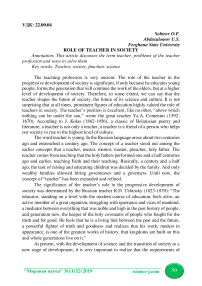Role of teacher in society
Автор: Sobirov O.F., Abdusalomov U.S.
Журнал: Мировая наука @science-j
Рубрика: Основной раздел
Статья в выпуске: 11 (32), 2019 года.
Бесплатный доступ
This article discusses the term teacher, problems of the teacher profession and ways to solve them
Teacher, society, function, science
Короткий адрес: https://sciup.org/140264072
IDR: 140264072 | УДК: 22.00.04
Текст научной статьи Role of teacher in society
The teaching profession is very ancient. The role of the teacher in the progressive development of society is significant, if only because he educates young people, forms the generation that will continue the work of the elders, but at a higher level of development of society. Therefore, to some extent, we can say that the teacher shapes the future of society, the future of its science and culture. It is not surprising that at all times, prominent figures of education highly valued the role of teachers in society. The teacher’s position is excellent, like no other, “above which nothing can be under the sun,” wrote the great teacher Ya.A. Comenius (15921670). According to J. Kolas (1882-1956), a classic of Belarusian poetry and literature, a teacher is not only a teacher, a teacher is a friend of a person who helps our society to rise to the highest level of culture.
The word teacher is young. In the Russian language arose about two centuries ago and entrenched a century ago. The concept of a teacher stood out among the earlier concepts that a teacher, master, mentor, master, preacher, holy father. The teacher comes from teaching that the holy fathers performed one and a half centuries ago and earlier, teaching Faith and their teaching. Basically, a century and a half ago, the task of raising and educating children was decided by the family. And only wealthy families allowed hiring governesses and a governess. Until now, the concept of “teacher” has been expanded and refined.
The significance of the teacher’s role in the progressive development of society was determined by the Russian teacher K.D. Ushinsky (1823-1870): “The educator, standing on a level with the modern course of education, feels alive, an active member of a great organism, struggling with ignorance and vices of mankind, a mediator between everything that was noble and high in the past history of people, and generation new, the keeper of the holy covenants of people who fought for the truth and for good. He feels that he is a living link between the past and the future, a powerful fighter of truth and goodness and realizes that his work, modest in appearance, is one of the greatest works of history, that kingdoms are built on this and whole generations live on it.”
At present, with the development of science and the transition of society to a new stage of development, it is very important to realize that the requirements of
modern society to the teacher are growing. At the same time, his contribution to the development of this society is growing.
To begin with, the role of the teacher in society, i.e. its social functions undergo changes along with the development of society itself. It cannot be otherwise: the teacher lives in society and, therefore, undergoes the same evolutionary and revolutionary changes that occur in this society with him. It is not surprising that in different historical eras, the social role of the teacher changed, evolved from the level of a hired artisan to a civil servant.
Any teacher not only teaches his subject, but also carries out pedagogical activities in general. And this means that as a teacher he constantly interacts with children, parents, colleagues, other people and performs certain necessary functions, that is, as they are otherwise called - “Functions of pedagogical activity”. Researches of scientists (N.V. Kuzmina, V.A. Slastenin, A.I. Shcherbakov, and others) showed that in the pedagogical process the following interrelated functions of a teacher are realized: diagnostic - related to the study of students in their level of education, training; prognostic - expressed in the teacher’s ability to determine the direction of educational activity at each stage of educational work; constructive design function - providing the selection and organization of the content of educational material, as well as assuming the setting of long-term long-term goals of training and education; organizational - related to the involvement of students in the pedagogical process and the stimulation of their activity; informational - related to the transfer of scientific, philosophical and moral-aesthetic information; communicative - involving the establishment of friendly relations with all participants in the pedagogical process; creative - determining the attitude of the teacher to pedagogical activity as a creative process.
The teacher, educator should be able to apply scientific knowledge (pedagogical theories) in his work and advanced pedagogical experience make up the content of the pedagogical profession, pedagogical specialty. Of course, the first steps will not be easy. In the first years of independent work, the teacher will tend to frequently turn to ready-made, someone developed recommendations and recipes.
But gradually, gaining experience and expanding the scientific horizons, having a desire and even courage, he will deviate from standards, from recipes and will gradually turn into a teacher - a master, a creative and entertaining educator.
Список литературы Role of teacher in society
- http://studme.org/141401135520/psihologiya/funktsii_pedagogicheskoy_deyatelnosti
- http://alligater.org/publ/31-1-0-471
- http://nsportal.ru/blog/shkola/obshcheshkolnaya-tematika/all/2012/01/09/rol-uchitelya-v-sovremennom-obshchestve


